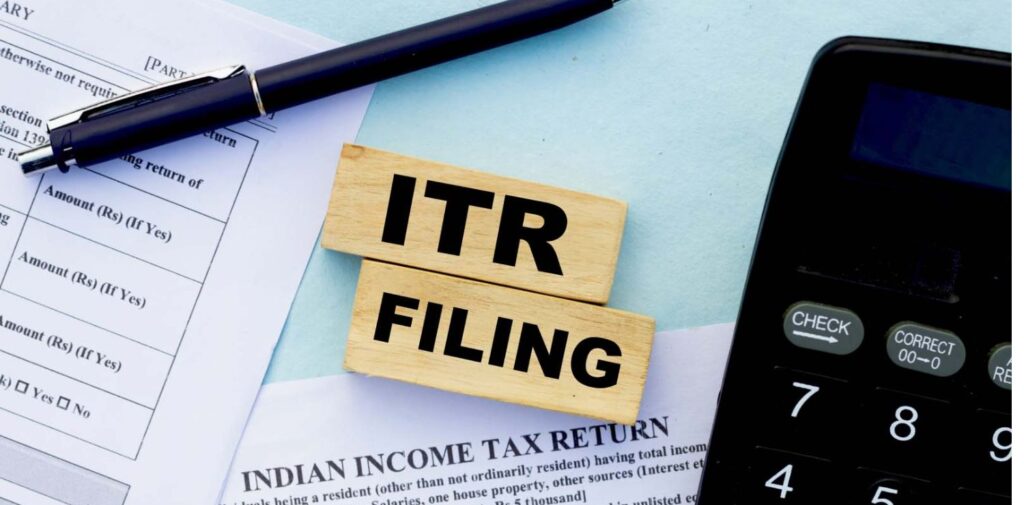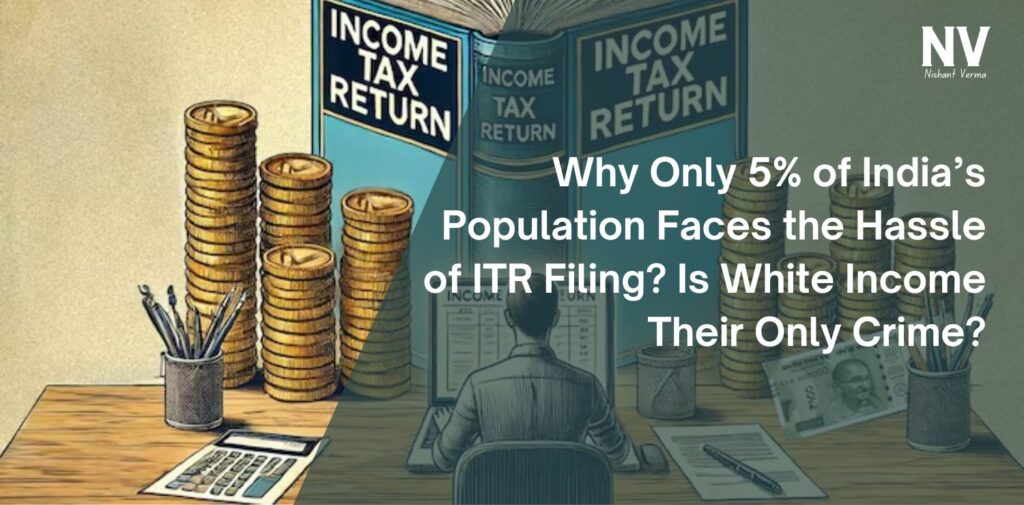Taxation is an essential component of any economy as it helps the government generate revenue to fund public infrastructure, social programs, and welfare initiatives. However, the process of ITR Filing can often feel more like a burden than a civic duty for many taxpayers in India. Out of a country with over 1.4 billion people, only around 5% file their ITR. This article dives into why such a small segment of the population has to go through the taxing process of filing returns, often enduring penalties and scrutiny, while the majority remain untouched by the complexities of the tax system.
The 5% ITR filing: Who Are They?
The 5% of the population who file their ITR mainly include salaried employees, business owners, and professionals like doctors, lawyers, and consultants. This segment consists of people who earn income from legitimate sources and have opted to declare their earnings transparently. They are the ones who have “white income,” meaning earnings that are legally reported and taxed. Yet, ironically, this honest declaration often makes them more susceptible to hassles, penalties, and prolonged scrutiny from tax authorities.

The Burden of Compliance
One of the primary reasons why many people dread filing ITR is the complicated nature of the process. The tax laws in India are complex, and the forms can be challenging to navigate, especially for someone without a financial background. Even minor errors or missing documents can lead to notices from the Income Tax Department, causing unnecessary stress and anxiety.
What’s more, taxpayers are often subjected to penalties for late filing, discrepancies, or mistakes that may not even be their fault. For instance, a salaried employee who relies on their employer for accurate tax deductions might face penalties if there’s a miscalculation or delay in paperwork.
Why Only 5% Bear the Load?
India’s population structure includes a large segment that either does not earn enough to qualify for paying taxes or operates within the informal economy, where income is not reported. Here’s why the remaining 95% don’t file ITR:
Low Income Threshold: A significant proportion of the population earns below the taxable limit. According to government data, over 70% of Indians earn less than ₹2.5 lakh per year, making them exempt from filing ITR.
Agricultural Income: In India, agricultural income is exempt from tax. Many people working in the agricultural sector, which employs over 50% of the population, do not need to file ITR.
Informal Economy: A vast majority of workers in India are part of the informal economy, where earnings are often cash-based and undocumented. This means they do not file returns, either because they are unaware of the process or because their income goes unreported.

What’s the Crime of the 5%? White Income?
The 5% who file their ITR are, in most cases, people with white income. Their income is documented, and taxes are paid at source or by self-assessment. The irony is that the very act of being transparent and honest puts them under the lens. They often face:
Increased Scrutiny: Due to computerized systems and algorithms that detect discrepancies, even genuine errors are flagged, leading to notices or further documentation requirements.
Penalty Traps: The penalties for late filing or incorrect information can be quite steep, ranging from ₹1,000 to ₹10,000. Even a small oversight can cost a taxpayer dearly, adding to their sense of frustration.
Refund Delays: Many honest taxpayers face prolonged delays in getting their refunds. Sometimes, it feels like they are “begging” for their own money, which has already been deducted from their salaries or paid through advance tax.
Harassment and Corruption: Despite digitization, cases of harassment or corrupt practices are not entirely eradicated. People are often forced to run from pillar to post to resolve their tax issues, further deterring compliance.
Why Can’t the System Be Simpler?
One of the common complaints among taxpayers is the lack of a simplified process. Many advanced economies have a pre-filled tax return system where the government already has all the required details, and the taxpayer only needs to confirm the accuracy of the information. In India, despite multiple reforms and improvements, the onus of proving the correctness of financial data still falls on the taxpayer.
Addressing the Elephant in the Room: The Remaining 95%
The reality is that a large chunk of India’s economy operates outside the formal financial system. This is why the remaining 95% of the population remains untouched by the tax filing process. But this situation leads to certain questions:
- Is it fair that the same 5% bear the burden while others evade taxes?
- What steps can be taken to bring more people under the tax net without adding to the existing burden?
- Can the government simplify the process to encourage more voluntary compliance?
Possible Solutions and the Road Ahead
There are several ways the system can be improved to ensure fairness and ease for taxpayers:
Simplification of Forms: Make tax forms easier to understand, with fewer sections and clear instructions. Providing pre-filled forms for salaried individuals can save a lot of time and confusion.
Raise Awareness: Many people are still unaware of the benefits of filing ITR, such as using it as proof for loans, visas, or insurance claims. Educating the public can encourage more people to file voluntarily.
Reduce Penalties: Instead of penalizing taxpayers for minor errors, the government could adopt a more lenient approach. For first-time offenders or small discrepancies, warnings or grace periods can be considered.

Expand the Tax Net: Gradually bringing more sections of the population under the tax net can reduce the burden on the existing 5%. Measures to document income in the informal economy and introduce lower tax rates for smaller earnings could help achieve this.
Transparency in Refunds: Implementing a transparent and efficient refund system will restore confidence among taxpayers. This can be achieved by leveraging technology and providing regular updates on the status of refunds.
Conclusion: A Plea for Balance and Fairness
It’s high time that the tax system in India is revisited to ensure that the honest taxpayer is not penalized for their integrity. While it is necessary for a country to have a robust tax collection mechanism, the process should not become a deterrent for those willing to comply. White income should be rewarded, not questioned repeatedly. The onus should be on expanding the tax base rather than squeezing the existing 5% further.
In the end, a simpler, fairer, and more inclusive tax system can go a long way in ensuring that everyone contributes their fair share without feeling burdened or alienated. After all, taxation should be about shared responsibility, not about singling out those who choose to be honest.




